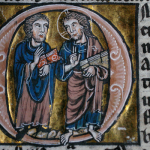A READER VS. A RABBI AND A CHURCH: Jim Ycotto takes issue with a bunch of stuff I said about “The Virtue of Hate.” I’m trying to curb theological disputation as part of my Lenten discipline (it’s way too easy to a) think that the Faith is only as strong as your own arguments for it, and b) be uncharitable; I’m hoping that by laying off for a season I will temper my worse tendencies, so I can return to the fray refreshed), so I’m only going to reply briefly to two points he makes. My replies are at the very end of the letter.
Ycotto: Enjoyed your observations on the blog re: “Virtue of Hate.” You have covered most of the bases. There are only a few points I would add in thinking about it.
1) The eternal reward is not missing from Christianity as some allege: For example the writer of “The Virtue of Hate” says: “One of the most fascinating differences between Judaism and Christianity is that while both faiths
believe in heaven, only Judaism speaks of one’s eternal reward as a chelek, a portion…” This is not so. There are numerous references to one’s eternal portion. Aside from the Christian’s portion there is the portion of Judas for whom doom was foretold by the prophets long before Christ appeared as the well known passage from Act 1: vs 16-20 illustrates. “Let his homestead become desolate, and let there be no dweller in it.” And the Lord warns that his of betrayer “it is better that he was not born.” (Matthew 26:24). Indeed the same prophet that weighed in as regards Judas is not even mentioned in “The Virtue of Hate,” namely, David, son of Jesse. His Psalm 71 is instructive for he considers the very matter of evildoing, and in psalm after psalm his recourse is in prayer to God. He specifically considers the very matter under discussion and was grieved by how evildoers seemed to prosper. The answer was in the sanctuary of God. Psalm 73:16, When I thought to be able to know this, it was a grievous task in mine eyes; 73:17 “Until I went into the sanctuaries of God; then understood I their end…” The ultimate arbiter for David is God, and the proper response from the man of faith is not hurling curses, but praying in the sanctuary of God. That prayer may indeed bear fruit, in the destruction of evildoers. The key is that we look to God for salvation and deliverance, which may be in this world, but if not, then in the judgement to come. In addition, there is noting in the doctrine of forgiveness that says we should excuse or pass over evildoing and not rejoice in seeing it crushed. Christians may forgive, but this does not mean that whatever punishment is due to an evil doer must be skipped over. Quite the contrary. More on this below.
2) The example of vengeful Samuel, Deborah and Samson: Quotations in “The Virtue of Hate” are made as to
Samson, Samuel and Deborah showing the Jewish focus on vengance as compared to wimpish character of
Christianity. But the writer misses a crucial point. Samson, Samuel and Deborah WERE JUDGES, specifically
raised up by God to avenge the opression of others against his people, and to recall the people from idolatry and lawlessness. IT WAS THEIR JOB TO ACT VIOLENTLY against the enemies of their people. The Book of Judges explicitly states this “And Jehovah raised up judges, and they saved them out of the hand of those that spoiled them..” (Judges 2: 14-19, see also incidents in Samuel). To do this military power was called for to break the enemy. Christians live in a different dispensation. They are not judges called on the use military power to defend or attack. Christ states so explicitly. Thus there is no real moral discrepancy between what the judges had to do and the present time. At the present time, the Christian is to pray for authorities that do precisely what Samson,
Deborah and Samuel did–that is to defend civilians against the depredations of foreign raiders and attackers. That is the job of government and Christians are to support that. Governemnts are not perfect but that does not invalidate the general principle of what their job is. Christian “forgiveness” presents no real moral contradiction
with this. We may all forgive the 9/11 attackers, but that does not mean we expect the government to simply roll over and accept the deaths of thousands. It is their job to administer vengeance as explicitly stated in 1 Peter 2: vs 13 and in Romans 13: 1-4. See full quotations below.
3) Old Testament prophets did not believe in “the virtue of hate.” To quote Samson, Deborah and Samuel as those who found hate a virtue is to profoundly misread the scriptures. They hated those who spoiled Israel, and they were specifically raised up to violently deal with such. They took the military measures that had to be taken.
They did not believe hate in itself is a virtue. This is a total distortion of the moral character and mission of the Judges. To see hate in itself as a virtue is one of the most poisonous and dangerous notions to have corrupted humanity. Apostles of hate like Hitler specifically and explicitly found hate to be quite useful, and a source of strength in and of itself. Communists specifically cultivated hate as an instrument to mobilize of people to commit mass murder. We know what the end results were. To even suggest this of the prophets shows a complete misunderstanding of their life and work.
4) Every human being will not be saved–this is old news in Christianity: “The Virtue of Hate” rightly points out that some Christians differ about whether all will be saved and says that even the Pope John Paul II has suggested that we cannot say with certainty that even Judas is in hell. Perhaps the Pope as claimed may not be quite clear about it, but the plain speaking of the scripture leaves no doubt. The matter of Judas for example, long prophesied before Christ is a case in point. It is stated plainly. (See Acts 1). In like manner Peter speaks of those “children of curse” to “whom the gloom of darkness is reserved for ever.” (See 2 Peter 2: 10-22). Numerous other scriptures clearly show and/or imply that these is a class of persons who refuse and disregard God’s salvation, and their end is eternal separation from God. The Apostle Paul especially labored to convince those closest to him, his fellow countrymen the Jews of this, but all men, whoever they might be are in the same danger. The plain speaking of the scriptures cannot be overemphasized enough as against the platitudes and
vague philosophizing of theologians.
5) Christianity does not exempt evildoers from obligation as alleged by some: In Wounds Not Healed by Time: The Power of Repentance and Forgiveness, Solomon Schimmel alleges that the Christian concept of forgiveness is skewed in the direction of imposing a moral obligation on the victim while going easy on the perpetrator. This view has no support from the Christian scriptures. If anything sinners are under a heavy obligation to repent. That
is the foundation of Christianity, and even for matters between Christians, restitution is to be made for offences against others See Ephesians 4. As for forgiveness, it is clear that the victim is under no obligation to simply rollover and forget about it. While we can all forgive, we are under no obligation to bypass punishment for evildoers, nor should we feel guilty about it as the tortured pacifist felt in Schimmel’s book.
Take the recent case of the woman on death row for murder and who was converted to Christianity while waiting. Some religious persons argued that she should receive clemency in view of this, along with assorted mitigating circumstances. But this is just plain wrong. A conversion is a good thing, but it still does not change the fact that a murder has been committed, and that a penalty for that murder must be executed. And no Christian would be wrong in approving the execution of that murderer. There is nothing wrong for example at a family in a ghetto giving heartfelt thanks to God and even rejoicing that a vicious nieghborhood thug or drug dealer has been taken off the streets for a long prison sentence. Indeed Paul states in 2 Timothy 3, vs 2, that we are to pray “that we may be delivered from bad and evil men.” If such are taken off the streets to prison or meet their just end on the electrical chair, so be it. That may indeed be the answer to the prayers that went up from the harrassed members of that ghetto church. It is difficult to see how tortured pacifists can tie themselves in knots over this.
6) Speaking of rulers and governments, again there are some who seem to think that Christian pacificism somehow means that Christians must meekly accept various evildoing. Again, this is not the plain teaching of the scriptures. Christians are not to take up the sword themselves as is well known, but there is another agent in the scriptures who is under obligation to do so. That other is government.That is the job of governments, which as the Apostles Peter and Paul remind us are to be a terror to evil works. Hence we are instructed by the scriptures to pray for governments in view of this. It is government’s role, indeed its obligation, to take vengence, and there is
nothing wrong in approving “vengeance on evildoers”, if the government has followed the proper laws and procedures (no forced confessions, fake evidence, etc) in doing so. This is too often forgotten by those who want Christians to rollover and say nothing in the face of evildoing. The scriptures quoted below also emphasize subjection to the authorities, and obedience to the law where the faith is not at issue, a point often missed by violent anti-government types in assorted “Aryan” churches, or more mainstream institutions that prefer to shuffle pedophiles from parish to parish rather than reporting them for punishment in accordance with the law. It should also be noted that evil governments are not exempt from God’s hand, as history well shows.
——
1 Peter 2: 13: Be in subjection therefore to every human institution for the Lord’s sake; whether to the king as supreme, or to rulers as sent by him, for vengeance on evildoers, and praise to them that do well.
Romans 13: 13:1- Let every soul be subject to the authorities that are above him. For there is no authority except
from God; and those that exist are set up by God. 13:2- So that he that sets himself in opposition to the authority resists the ordinance of God; and they who thus resist shall bring sentence of guilt on themselves.
13:3 -For rulers are not a terror to a good work, but to an evil one. Dost thou desire then not to be afraid of the authority? practise what is good, and thou shalt have praise from it; 13:4 -for it is God’s minister to thee for good. But if thou practisest evil, fear; for it bears not the sword in vain; for it is God’s minister, an avenger for wrath to him that does evil.
—-
7) Forgiveness also has a moral component in that it can affect the conscience of an evildoer. The applicable scripture that can be considered in this regard is: Romans 12: 19-21 “..not avenging yourselves, beloved, but give place to wrath; for it is written, Vengeance belongs to me, I will recompense, saith the Lord. If therefore thine enemy should hunger, feed him; if he should thirst, give him drink; for, so doing, thou shalt heap coals of fire
upon his head…” The “virtue of hate” would seek eternal damnation for enemies. For the Christian however, the matter rests with the Judge of all nations who will surely recompense. Meanwhile, by setting an example of forgiveness, the evildoer’s conscience will be affected by “coals of fire,” perhaps leading him to repentance and atonement. Affecting someone’s conscience by grace and restraint does not mean rolling over and playing dead, muttering meaningless politically correct platitudes, or remaining silent as many find it politic to do. On the
contrary it means standing up to evil, speaking plainly and forcefully, not in obfuscation, dissimulation or vague pronouncements. “Coals of fire” can be seen primarily an an individual matter but it can have wide implications. The Civil Rights Movement for example may have benefited from “coals of fire” in its early stages (the awakening of white consciences to the reality of was happening in the “land of the free”), before it degenerated into something else. Of course consciences may not be swayed at all, but the Christian testimony of forgiveness and grace has this in view–not much time should be spent in hurling fire and brimstone curses. It is thus in stark contrast to the spirit mentioned in “The Virtue of Hate.” Of course, God also takes account of the response of one who is confronted by the conseqeuences of wrongdoing. Failure to repent will be held accountable. Also to be noted is that in the interim, until the Day of judgment, God is not relying on the consciences of men. He has
set up governments (the principle) to punish and control those whose consciences and moral senses are not exercised to stop wrongdoing.
8) In the final analysis, “The Virtue of Hate” correctly shows the clear differences between Judaism and Christianity although not in exactly the way some would imagine. Some may see virtue in hate but Christianity of course operates in a different way. The Christian knows that final vengance rests with God. There is no need to pray for eternal damnation. That matter is in God’s hands. In the interim, governments, flawed as they may be, are to take the action that is necessary, and Christians are not wrong in supporting that. The Jewish prophets were not wrong in cursing their enemies. That was the dispensation they lived in–an embattled nation surrounded by the idolatry of the Gentiles. The dispensation we live in at the present time is Christianity, which applies
different rules of conduct. There is no single nation for Christians are present in all nations (facing opposition from atheists and church establishments alike) and there is no need for biological definition as to who is one of the chosen or not. The qualifications are entirely moral and spiritual, resting on the death, resurrection and ascension of Christ. God you can say has moved on from the limits of the Jewish dispensation although many do not like
to hear this said. It is reason to value the revelation of Christianity, and how different it is to Islam and Judaism. Of special note to Christians too is the fact that while not excusing or covering up evil (a point some seem to forget), we are called upon to exercise grace, mercy and forgiveness towards one another (1 John 5, vs 16). In addition, if we indulge in a harsh and unforgiving spirit, we cannot expect God to deal with us lightly as regards our own failings (Matthew 6: 14, 15).
9) No doubt you will find this missive too long, and no doubt you will be offended by some things written. I note that you say that you are actively seeking the faith. More power to you. I believe that as you go on you will not be left to your own resources but can rely on the Spirit of God. Your faith is now anchored in the Church and that is a good start, but as you go on I think you will see that the ground there is increasingly shaky. For example, you say elsewhere that you don’t see how someone can rely on the gospels without relying on the Church. That may be so but it is also true that the Church vigorously opposed the publication of said Gospels into the common language of the people, going so far as to killing several who dared do this. Indeed many of the translations that
developed subsequently are more accurate and reliable than those held by the Church. If the Church had had
its way, the wide dissemination of the gospels, indeed of the entire Bible might never have taken place. The
History of the Protestant Reformation offers many examples of what the Church was and in many ways still is.
Also as you study the scriptures you will see that they are at odds with what the Church teaches in many ways. For example, the Gospels clearly show that Mary had several children besides Jesus. See for example the plain statement in Mark 6:3 “Is not this the carpenter, the son of Mary, and brother of James, and Joses, and Judas, and Simon? and are not his sisters here with us?..” Compare this against various doctrines about Mary and you get an idea what I mean. There are numerous other fundamental discrepancies of course but I believe in time you will see what I mean. No doubt for now you will reject what I say. That is all right.
The only thing I would add is your primary resource must be the Spirit of God and as helped by him you will see the value of the plain scriptures. The plain speaking of the scriptures can help cut through a lot of the fog. It is the same plain speaking of the prophets, the Apostles and Jesus himself. Note his blunt speaking to the Pharisees and the religious hierarchy who opposed him in the gospels. Good luck on your spiritual journey.
———————–
Eve again: Thanks very much for your time and concern. As I said, I’ll just say a couple things, and I’ll try to say them quickly:
1) “Old Testament prophets did not believe in ‘the virtue of hate.’ To quote Samson, Deborah and Samuel as those who found hate a virtue is to profoundly misread the scriptures. They hated those who spoiled Israel…” (emphasis mine)–Yes, but it’s precisely this hatred of those who spoil Israel that Rabbi Soloveichik is defending. He’s not talking about focusing on hatred, or building up hatred against scapegoats, or basing one’s Jewish identity on “not being like them,” or any such thing; he’s talking about how Jews should view those who specifically attack and attempt to destroy the Jewish people, from Haman through Hitler through Hamas.
2) My question about relying on the Gospels without relying on the Church is based on two things: First, that the canon of Scripture in no way exhausts the available narratives of the life and work of Jesus and His apostles. How do we know that the Gospel of Luke is true and demands our assent while the Gospel of Nicodemus does not? Why Acts and not Thomas? We can either peruse each potential scripture and make up our own minds, in which case I strongly suspect we will be led more by the prevailing culture and our individual mindset than by the Holy Spirit (because we have fewer opportunities for “outside” authorities to challenge or surprise us–I do realize of course that we have to discern which authorities to trust, but I really do think that’s easier than freelance Biblical interpretation), or we can rely on a canon. That canon comes from the Church. (The Old Oligarch, on a tangentially related note, has an excellent post looking at a book excised from the canon by Protestant reformers. As Saint Teresa might say, this post is very profitable.) There is no Bible that does not come already equipped with an interpretive framework, embedded in an interpretive tradition, simply because some books are chosen and some are left out. (And that’s before we even get to the question of how translations can warp a text!)
And second, I have really never found the Bible to be obvious in the way that Mr. Ycotto seems to find it. This is perhaps due to the fact that I first read it before I was Christian, and found it, frankly, opaque and baffling. There were a few books I loved, notably the Song of Songs and Proverbs, but the rest of it–“whuh??” was my basic reaction. Even today, I’m amazed at how much depth and complexity there is in the Bible; I get little glimpses of it when the Oligarch effuses to me about some fascinating thing he’s just learned from his study of the Church Fathers or the original Hebrew, things which truly illuminate the meaning of various difficult passages.
And I think my view, that the Bible is not quite as plain-spoken (or, perhaps more accurately, Scripture speaks plainly but we are hard of hearing) as Mr. Ycotto presents it, is borne out by history. When people read the Bible, even when they pray, even when they read in community with other Christians, they don’t come to the same conclusions; hence the wild plethora of sects and interpretations. So when one seeks to understand Scripture, I think it is wise to also seek an interpretive community whose guidelines make sense and which has maintained continuity from the time of Christ.











